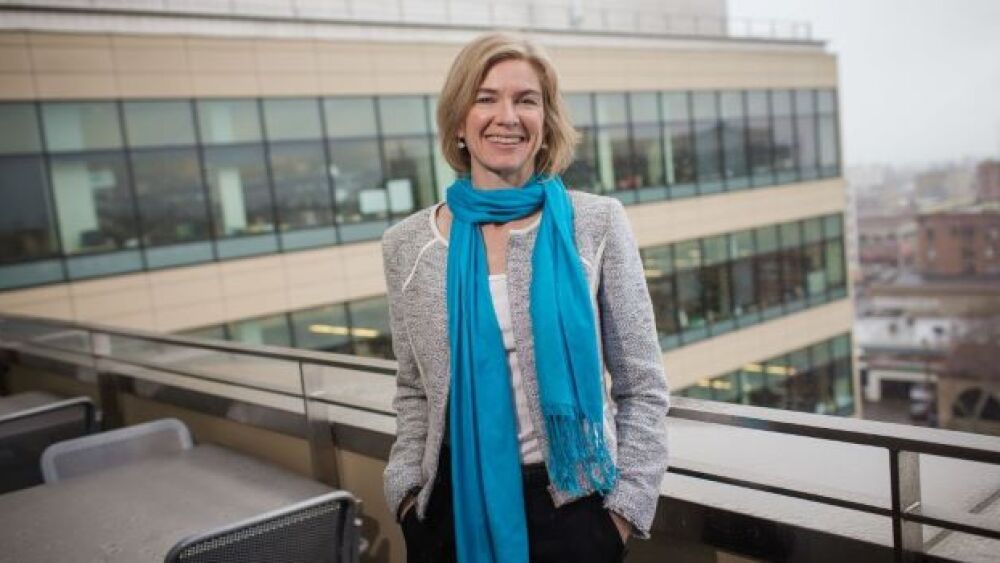WIES fellows will have access to successful female entrepreneurs, including CRISPR pioneer and Nobel laureate Jennifer Doudna, who founded the IGI.
IGI Founder Dr. Jennifer Doudna/Nick Otto For The Washington Post via GI
A new genomics incubator launched Tuesday specifically to help women entrepreneurs by promoting gender equity in science and entrepreneurship in the field of genomics.
Launched by the Innovative Genomics Institute (IGI) at the University of California, Berkeley, the “HS Chau Women in Enterprising Science (WIES) Program” aims to enhance gender equity in bio-entrepreneurship and give female founders the launching pad they need to translate genomics research into real-world solutions.
The program is designed to attract, mentor and fund promising female entrepreneurs, either new post-doctoral fellows or UC-Berkeley faculty members looking to develop their ideas into businesses.
“We want to level the playing field, to help women get enough funding and take the entrepreneurial leap,” Melinda Kliegman, IGI director of public impact, told BioSpace.
Phase I – the first year of the program – begins September 2022. For this phase, four entrepreneurs will be selected to conduct foundational research to support their ideas. Each of the four fellowships comes with up to $150,000 for salary, benefits, supplies and educational programming.
At the end of the first year, up to two fellows will enter Phase II, which comes with a $1 million startup package from the HS Chau Foundation. The fellows will continue to have access to the IGI community for another 18 months. “That’s a pretty unique launch package,” Brad Ringeisen, IGI executive director, told BioSpace.
In addition to funding and mentorship, the WIES program provides office and lab space. “We’re in the process of renovating a floor as an office and meeting space solely for female entrepreneurs,” Kliegman said.
What sets WIES apart from other incubators is its emphasis on building a community around the program. WIES fellows will have access to successful female entrepreneurs, including CRISPR pioneer and Nobel laureate Jennifer Doudna, who founded the IGI, as well as advisors selected from among UC Berkeley professors and venture capitalists. It also includes certain UC-Berkeley resources to enhance learning opportunities.
“We’re a premier institution with one of the most famous scientists in the world. Our network will provide a tremendous wealth of experience and build a community to help launch careers and companies,” Ringeisen said.
“I’ve found being an entrepreneur in the biotech world incredibly exciting and rewarding,” Doudna said when making the announcement. “But too few women have the opportunity to become entrepreneurs, even though a lot of the needed innovation today is coming from women researchers. If women have the dream of founding a company based on their research, the barriers that stand in their way need to be removed.”
Today, there are roadblocks. As Ringeisen pointed out, “You see a significant number of women graduate students in biology and biotech, but their numbers as entrepreneurs are reduced. We’re hypothesizing that’s because of the lack of funding, community and a supportive environment.”
The reason is only partially societal, through. “The reason there are so few female entrepreneurs starts way back in the beginning, with too few women in STEM (science, technology, engineering and math). It’s partially related to how women are socialized regarding risk-taking. Many never considered becoming the head of a company and building a community from the ground up,” Kliegman said.
“Then, at the point they do decide to become entrepreneurs, they receive a fraction of the funding that men do in biotech,” she continued. Last year, a Harvard Business Review study found that female founders in biotechnology only received 2.3% of venture capital funding in 2020. Yet, according to Crunchbase’s 2020 Funding to the Female Founders report, “In 2019, 20 percent of global startups that raised their first funding round had a female founder, doubling from 10 percent in 2009.” That’s a notable imbalance.
“Our donors want to build the community and support to rebalance this situation,” Kliegman said. “Programs like WIES help women to consider becoming entrepreneurs.”
Also, Kliegman, added, “We’re trying to ensure that innovations are aligned with societal values so they are ethical, affordable, sustainable, equitable, etc. We will select fellows based upon alignment with those values as well as on the strength of their proposal, the science, unmet needs and milestones.”
The selection committee for the IGI-WIES program is led by Doudna, Ringeisen, and several UC-Berkeley professors. Entrepreneurial advisors include Helen S. Kim from Vida Ventures and Luciana Borio from ARCH Venture Partners.
Applications for the IGI-WIES program just opened. Applications received by April 1, 2022 will receive priority for consideration, but will be accepted until April 30, 2022. Selected WIES program fellows will be announced by June 1, 2022.
Successful candidates will have programs that align with the IGI’s technology – genomics and genomics tools. “We plan to err on the side of broad interpretations,” Ringeisen acknowledged. “It’s global impact that we’re looking for.”
To learn more about the program and submit an application, visit enterprisingscience.org.






